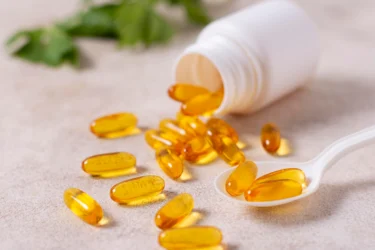Vitamin D is a fat-soluble vitamin, meaning it dissolves in fat and is stored in the body for later use. It is crucial for bone health and helps maintain a strong immune system. Despite its importance, vitamin D deficiency is a global problem, affecting up to 80-90% of people, with children being especially vulnerable1,2.
This deficiency is a serious concern because it can lead to a range of health problems, from bone issues to links with autoimmune disorders, heart disease, and other chronic conditions1. Because of these risks, it’s important to identify and address vitamin D deficiency as early as possible, particularly in children. This article provides practical tips and strategies to help prevent and manage vitamin D deficiency in children, which often goes unnoticed.
Children need vitamin D to build strong bones and support proper growth. It enables the body to absorb and retain calcium and phosphorus, the two minerals crucial for healthy bone development and preventing conditions like rickets. Rickets is a disorder which leads to soft and weak bones, primarily in young children, especially those under two years of age. Not just young children, without sufficient vitamin D, older ones and adolescents may also have brittle bones and are more likely to experience fractures2.
Beyond supporting bone health, vitamin D also contributes to a well-functioning immune system by helping the body fight off infections and stay healthy1. Vitamin D may also influence mental well-being of your child. Emerging research2,3,4 indicates that children with low vitamin D levels may have a higher risk of mood disorders such as depression. This highlights the importance of ensuring adequate vitamin D intake during the growing years, not just for physical development, but for overall health and emotional resilience as well.
The good news is that vitamin D deficiency is easy to prevent with the right diet or supplements, so make sure your child’s intake is regularly monitored.
Parents often wonder how much vitamin D is safe for a child to ensure healthy growth without the risk of overdose. The American Academy of Pediatrics (AAP) outlines the following recommended guidelines in IU. It stands for International Units, a standard way of measuring vitamins:
For kids under the age of 1, the recommended daily intake of vitamin D is 400 IU2,3.
Note: The amount of vitamin D your baby is getting depends on the kind of milk he is drinking (formula or breastfed)3. Therefore, it’s important to consult your paediatrician to ensure your baby is getting the right amount.
For kids over the age of 1, the recommended daily intake of vitamin D is 600 IU2,3.
Note: In some cases, doctors may recommend between 600 and 1,000 IU daily, depending on the child’s health, diet, and risk factors4.
Getting an expert ensures your child receives just the right amount of vitamin D for healthy growth, especially if they have health concerns or dietary restrictions.
Below are the key short- and long-term consequences of insufficient vitamin D levels:
This list may feel overwhelming, but not all risks apply to every child. For peace of mind, speak with your paediatrician to assess your child’s needs and create a plan that supports long-term health. You can support their well-being by encouraging safe sun exposure, including vitamin D-rich foods in their diet, and regularly checking their levels to ensure they’re getting the right balance as they grow.
Common causes of vitamin D deficiency in children include9,10:
Vitamin D deficiency in children symptoms include the following1,5:
It’s important to note that some children may show no obvious symptoms, making regular check-ups and nutritional monitoring essential for early detection of vitamin D deficiency in kids.
Also Read: Top Immunity Boosting Foods for Kids
Early detection of vitamin D deficiency is crucial, as symptoms like fatigue, muscle weakness, or bone pain are often mistaken for normal childhood fatigue or growth changes. Since vitamin D is vital for bone health, ensuring adequate levels during early years is essential to prevent long-term bone issues like rickets.
If you’re concerned about your child’s vitamin D levels, consulting a paediatrician is recommended. A simple blood test can provide clarity and guide necessary adjustments, whether through diet or supplementation. Some common blood tests include:
If vitamin D test is not included in your child’s routine examination then it is advisable to request for one to avoid missing diagnosis of deficiency.
Dr. Nayana S Shetty, MBBS, MD
Deficiency of vitamin D in children causes long-term complications like stunted growth and weakened immunity if not addressed early. Therefore, managing this condition is highly crucial. Here’s how it can be addressed:
Doctors may prescribe vitamin D supplements for the treatment of vitamin D deficiency in children (based on the child’s specific needs)1,2. A common approach involves 2,000 IU of vitamin D3 daily or 50,000 IU once a week for 6 weeks, under medical supervision. Once blood levels of vitamin D rise above 30 ng/mL, a maintenance dose of 1,000 IU daily is usually advised to keep levels stable5.
It’s important to supplement breastfed infants with 400 IU of vitamin D daily, as breast milk typically contains low levels of vitamin D. However, parents should note that formula-fed infants who consume at least 1 litre of fortified formula generally do not require additional vitamin D supplementation5. Always consult with your paediatrician before starting or changing your child’s vitamin D supplement regimen to ensure they are receiving the appropriate dose for their health needs.
Note: Keep in mind that vitamin D supplementation should only be given based on a doctor’s recommendation. Over-supplementation may lead to harmful effects, such as vitamin D toxicity. Therefore, you should never increase/adjust the dosage on your own. Additionally, regular follow-ups with your healthcare provider are essential to monitor your child’s vitamin D levels and make any necessary adjustments to the dosage to ensure optimal health.
Include vitamin D foods for kids in daily meals. These include foods that are naturally high in or fortified with vitamin D2. To help you choose foods rich in vitamin D, here is a list of common options along with their vitamin D content per serving6:
| Food | Vitamin D (IU) per serving |
| Cod liver oil, 1 tablespoon | 1,360 |
| Trout (rainbow), farmed, cooked, 85 grams | 645 |
| Salmon (sockeye), cooked, 85 grams | 570 |
| Mushrooms, white, raw, sliced, exposed to UV light, ½ cup | 366 |
| Milk, 2% milkfat, vitamin D fortified, 240 mL | 120 |
| Soy, almond, and oat milks, vitamin D fortified, various brands, 240 mL | 100 to 144 |
| Ready-to-eat cereal, fortified with 10% of the DV for vitamin D, 1 serving | 80 |
| Sardines (Atlantic), canned in oil, drained, 2 sardines | 46 |
| Egg, 1 large, scrambled | 44 |
| Liver, beef, braised, 85 grams | 42 |
| Tuna fish (light), canned in water, drained, 85 grams | 40 |
| Cheese, cheddar, 42.5 grams | 17 |
| Mushrooms, portabella, raw, diced, ½ cup | 4 |
| Chicken breast, roasted, 85 grams | 4 |
You may also include foods rich in calcium, such as milk, yogurt, and cheese, as they help enhance the absorption of vitamin D and support bone health14.
Sunlight helps the body produce vitamin D naturally2. Encouraging your kids to spend time outdoors (such as playing or walking in the sunlight) will allow their skin to absorb UVB rays, which trigger vitamin D production15.
Type B UV (UVB) radiation with a wavelength of approximately 290 to 320 nanometers penetrates open skin and converts vitamin D2 to previtamin D3, which later becomes vitamin D3. UVB radiation cannot penetrate glass; so being in sunshine indoors, through a window, will not produce vitamin D. Thus, it is important for children to play outside with some uncovered skin19.
Dr. Nayana S Shetty, MBBS, MD
Note: While sunlight is essential for vitamin D production, it’s important to be mindful of the risks of overexposure to UV rays, such as sunburn and long-term skin damage. Parents should aim to balance sun exposure with adequate protection.
Additionally, since factors like weather and lifestyle can affect vitamin D production, supplementation could be a helpful backup, especially during months with limited sun exposure. Consult your paediatrician to determine the best approach for your child’s vitamin D needs based on their individual health, lifestyle, and environment.
Also Read: Neural Tube Defects: Causes, Types, Treatment & More
Minimising the risk of vitamin D deficiency in children is critical in reducing the risk of skeletal disorders and other long-term health complications in children. Here’s what you can do:
Also Read: Top Vitamin B12 Foods to Include in Your Diet Today!
If you’re concerned that your child may not be getting enough vitamin D, or if they show signs of deficiency, such as1,5:
It’s important to consult with your doctor if your child has any risk factors for vitamin D deficiency, including:
In these cases, your doctor may recommend regular monitoring of your child’s vitamin D levels to ensure they stay within a healthy range. Early detection and treatment of vitamin D deficiency in children can help prevent complications, like rickets, and ensure your child’s proper growth and development. Regular check-ups provide reassurance and offer a proactive approach to keeping vitamin D levels balanced.
Parents often think that vitamin D is a test needed only for adults. However, this is not true. Regular vitamin D testing can help identify and correct a vitamin D deficiency in children, as it is critical to support their rapid growth18.
Dr. Nayana S Shetty, MBBS, MD
Vitamin D is essential for children’s bone health, growth, and immune function. Deficiency of vitamin D in children causes a range of health issues, including poor bone development, muscle weakness, and an increased risk of rickets. While this deficiency is common, it is also avoidable and manageable through a combination of sunlight, a nutritious diet, and supplements when needed. Therefore, timely diagnosis and appropriate management can help support healthy growth and overall well-being in children.
Also Read: Vitamin D for Women – Daily Need, Normal Range, Deficiency & Solution
During autumn and winter, when sunlight may not be strong enough to allow your body to produce adequate vitamin D, supplementation may be necessary, especially for those who live in areas with limited sun exposure or who spend little time outdoors.17 It’s important to consult your doctor to assess your individual needs and determine the best way to meet your vitamin D requirements during these months.
Consuming too many vitamin D supplements over an extended period can lead to a dangerous buildup of calcium in the body, a condition known as hypercalcemia. This can weaken bones, damage kidneys, and negatively affect the heart. It’s crucial to follow your doctor’s recommendations regarding the appropriate dosage and never exceed the advised intake without professional supervision17.
It is not possible to overdose on vitamin D through sun exposure because the body naturally regulates its production of the vitamin. However, excessive sun exposure can lead to skin damage and increase the risk of skin cancer. Always protect your skin with sunscreen, wear protective clothing, and avoid prolonged exposure to the sun, especially between 10 a.m. and 4 p.m17.
Vitamin D supplements for children are available in several forms, including liquid drops (ideal for infants), chewable tablets, gummies, and soft gels. Your doctor can guide you on the most appropriate form and dosage based on your child’s age, health needs, and dietary habits2,10.
Low vitamin D levels may indicate insufficient sun exposure, inadequate dietary intake, or absorption issues due to underlying health conditions. High levels, on the other hand, may suggest excessive vitamin D intake, particularly from supplements, and should be monitored closely. Symptoms of vitamin D toxicity are rare but can include nausea, weakness, and kidney problems. It’s important to regularly monitor vitamin D levels and work with your healthcare provider to ensure they stay within a safe range1,10.
Disclaimer: The information provided here is for educational/awareness purposes only and is not intended to be a substitute for medical treatment by a healthcare professional and should not be relied upon to diagnose or treat any medical condition. The reader should consult a registered medical practitioner to determine the appropriateness of the information and before consuming any medication. PharmEasy does not provide any guarantee or warranty (express or implied) regarding the accuracy, adequacy, completeness, legality, reliability or usefulness of the information; and disclaims any liability arising thereof.
The butterfly-shaped thyroid gland plays an essential role in regulating most of the metabolic processes of the body. Thermoregulation, influence over hormonal function, and weight management are just some of the important functions of this gland.
Those who suffer from thyroid problems can look at home remedies to deal with the issue more comprehensively, along with the medications prescribed by the doctor. It is essential to note that thyroid hormone-related disorders need to be treated by expert doctors; sometimes, patients have to take medications for a prolonged period of time, even for the rest of their lives.
Before we get into home remedies, we need to cover the basic differences between hyperthyroidism and hypothyroidism based on their symptoms:
People suffering from hypothyroidism should avoid excessive consumption of cruciferous vegetables(cabbage, broccoli) and soy products; these foods contain goitrogens, which might interfere with the production of thyroxine hormone.
Dr. Nikhil Yadav, MBBS MD, CCEBDM
Also Read: Home Remedies For Strep Throat By Dr. Rajeev Singh
Based on these differences, you may get an idea of which form of thyroid issue you have, but always check with your doctor, who will recommend a thyroid test for a clear diagnosis.
Friendly Reminder: The information shared here is for educational purposes only, and the reader should consult a registered medical practitioner before implementing any changes to their health routine.
Did you know?

Coconut oil has medium-chain fatty acids that help in the better functioning of the thyroid gland. Coconut oil, specifically when taken in a non-heated form, helps lose weight, increases metabolism, and balances body temperature.
Unlike other types of oils, coconut oil has a high content of saturated fat. With the right combination of exercise and a properly balanced diet, coconut oil could be good for the thyroid glands.

Apple cider vinegar helps in the balanced production and expression of some hormones to some extent. It might improve metabolism8
Apple cider vinegar might help regulate body fats, wash away toxins from the body, and absorption of nutrients. Apple cider vinegar can be added to water along with honey and can be taken every morning.

This is one of the easiest supplements for thyroid as it is easily available. Ginger is rich in essential minerals like potassium and magnesium, and might help to regulate inflammation, one of the primary causes of thyroid issues. It is easiest to have ginger tea.
It can also be used as an essential oil. If ginger is mixed with a carrier oil (coconut oil, for example) it can be applied to the body. Ginger oil can also be used via essential oil diffusers.

B vitamins are important for thyroid health, but they work in conjunction with other factors like iodine and selenium to support thyroid health. Including eggs, meat, fish, legumes, milk, and nuts in the daily diet might help with a steady supply of Vitamin B5.
Since the diet may not be able to meet the daily requirements, taking supplements will help.

The deficiency of vitamin D can contribute to thyroid problems. Since the body can produce it only when exposed to the sun, ensure that you get a minimum of 15 minutes of sunlight daily. An adequate vitamin D level will also lead to better calcium absorption and good immunity.
Some foods that are rich in Vitamin D are fatty fish like salmon and mackerel, dairy products, orange juice, and egg yolks4,1. If Vitamin D levels in the body are very low, supplements will be necessary. However, one must be cautious and consult with a doctor about dosage because too much vitamin in the body can be harmful.
Also Read: Home Remedies For Tonsillitis

Most nuts are beneficial to the body in some way or another. Almonds might have a beneficial effect on thyroid function. They are a good source of protein, fibre, and minerals.
Almonds have selenium in small amounts, which is a healthy thyroid nutrient. It is also very rich in magnesium, which can keep the thyroid gland working very smoothly.

Milk, cheese, and yoghurt might be beneficial for the thyroid as they contain iodine1, a mineral that is essential for proper thyroid functioning. Consuming dairy products will also help with increasing vitamin levels, which in turn will help with thyroid problems.
Also Read: Home Remedies For Throat Infection By Dr. Siddharth Gupta

Mixed beans with kidney mung black and Soy Bean9 – Healthy and Nutrition food concept style
Beans are a powerhouse of nutrition. They are rich in fibre, protein, essential minerals, and vitamins. Beans are rich in antioxidants and complex carbohydrates. Since beans are also very high in fibre, they might help with constipation, which is a common symptom of hypothyroidism.

Another thing that might work in improper thyroid functioning could be taking iodine supplements. This becomes more important for those who are vegetarians and reside in areas with iodine insufficiency. These supplements restore the balance of iodine in the body and help with thyroid health. Supplementation should be done carefully under medical supervision to avoid excess iodine

Seaweed is a type of very large algae that grows in saltwater and marshes. It typically contains high to very high concentrations of iodine. Iodine is an essential mineral required by the thyroid gland for the formation of thyroid hormones1.
However, please note that for both seaweed and iodine supplements, excessive amounts of iodine may itself result in poor thyroid function and goitre. Please check with your doctor before trying either of these out.

Needs to be changed to : Regular exercises have plenty of health benefits. This habit can help with managing thyroid hormone imbalances as well .
Discipline and focus are the keys to good thyroid health.
Also Reads: 8 Most Effective Foods To Fight Thyroid Disorders!
Over time, if hypothyroidism is left untreated, it can cause a number of health problems, such as obesity, joint pain, infertility, and heart disease7.
Weight gain or difficulty losing weight, constipation, dry skin, hair thinning, fatigue, enlarged thyroid, and hoarse feeling in your throat are some of the major warning signs for thyroid7.
If you have a thyroid hormone-related problem that is not treated in time, serious health complications can arise. An overactive thyroid (hyperthyroidism) can lead to a number of problems, including eye problems, such as bulging eyes, blurred or double vision, or even vision loss in the future6.
Testing for thyroid function typically does not require fasting. Thyroid blood tests, such as TSH, T3, and T4, can usually be done at any time of the day without the need for fasting. However, it is always best to follow your healthcare provider’s specific instructions.
Yes, thyroid disorders can cause headaches. Hypothyroidism and hyperthyroidism can both contribute to headache symptoms due to hormonal imbalances and their effects on the body’s systems. Proper management of thyroid conditions can help alleviate headache symptoms7.
Yes, thyroid disorders can affect menstrual periods. Hypothyroidism (underactive thyroid) and hyperthyroidism (overactive thyroid) can cause irregular menstrual cycles, heavier or lighter periods, and changes in cycle length due to hormonal imbalances. Proper treatment of thyroid conditions can help regulate menstrual cycles.
Yes, thyroid disorders can affect pregnancy. Both hypothyroidism and hyperthyroidism can impact fertility, pregnancy outcomes, and fetal development. Proper management and monitoring of thyroid levels are crucial for a healthy pregnancy. Ideally, thyroid hormone levels should be maintained in a healthy range well before conceiving7.
Yes, hyperthyroidism (an overactive thyroid) can cause weight loss due to an increased metabolic rate, leading the body to burn calories faster than usual. Conversely, hypothyroidism (an underactive thyroid) typically causes weight gain7.
Yes, thyroid disorders can cause hair loss. Both hypothyroidism and hyperthyroidism can disrupt the normal hair growth cycle, leading to thinning hair or hair loss. Proper treatment of the thyroid condition often helps restore normal hair growth7.
Yes, alcohol can affect thyroid function. Chronic alcohol consumption may interfere with thyroid hormone production and metabolism, potentially leading to thyroid dysfunction. It can also affect the gland’s ability to produce hormones, impacting overall thyroid health.
Thyroid disorders can often be managed effectively, but permanent cures are rare. Hypothyroidism typically requires lifelong treatment to control hormone levels. Hyperthyroidism might go into remission with effective medications for an appropriate time period. However, certain conditions like thyroiditis, may resolve on their own, and surgical options can provide a long-term solution for some thyroid issues.
Yes, thyroid patients can donate blood if their condition is well-managed and they meet all other eligibility criteria. It is important to ensure their thyroid levels are stable and they are not experiencing symptoms that could affect their ability to donate safely. Always check with the blood donation center for specific guidelines.
Yes, thyroid disorders can have a genetic component. Family history of thyroid conditions increases the likelihood of developing thyroid issues, suggesting a hereditary link. However, environmental factors and lifestyle choices also play significant roles in the development of thyroid diseases.
No, thyroid disorders are not contagious. They are medical conditions that result from various factors such as genetics, autoimmune issues, or environmental influences. Thyroid disorders cannot be transmitted from person to person like contagious diseases.
Disclaimer: The information provided here is for educational/awareness purposes only and is not intended to be a substitute for medical treatment by a healthcare professional and should not be relied upon to diagnose or treat any medical condition. The reader should consult a registered medical practitioner to determine the appropriateness of the information and before consuming any medication. PharmEasy does not provide any guarantee or warranty (express or implied) regarding the accuracy, adequacy, completeness, legality, reliability or usefulness of the information; and disclaims any liability arising thereof.
Links and product recommendations in the information provided here are advertisements of third-party products available on the website. PharmEasy does not make any representation on the accuracy or suitability of such products/services. Advertisements do not influence the editorial decisions or content. The information in this blog is subject to change without notice. The authors and administrators reserve the right to modify, add, or remove content without notification. It is your responsibility to review this disclaimer regularly for any changes.